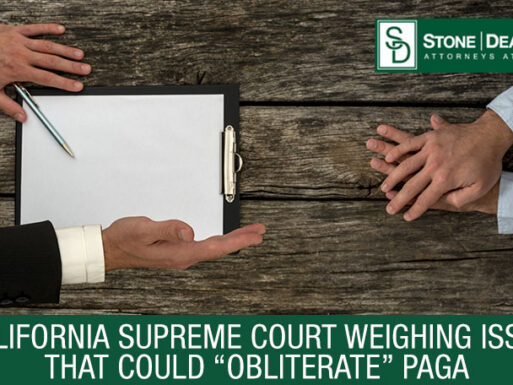Going Once, Twice, Sold: How Warehousemen Can Properly Sell Goods on a Lien to Settle Debts
A warehouseman has a lien on goods left in his care as security for payment for all services performed, including storage charges, processing fees, transportation, and auction fees. The lien protects the warehouseman in the event that the bailor, or person entrusting her goods to the warehouseman, defaults on her obligations to the warehouseman. Unfortunately, these trying economic times have caused a significant increase in the amount of bailor defaults, which has increased the amount of warehouse auctions.
One recurring issue of significance to the moving and storage industry is how to execute on the lien following the bailor’s default. In California, this process is governed by California Commercial Code Section 7210. The code imposes mandatory requirements concerning notice of the intent to sell the liened goods, conducting the sale, handling the proceeds from sale, and other aspects of executing on the lien. Deviation could result in the warehouseman’s civil liability to the bailor for, e.g., conversion, and possibly for punitive damages.
The process for executing on a lien under Section 7210 breaks down into three major phases:
- Giving notice of the intent to sell the goods
- Advertising the sale
- Conducting the sale
Giving Proper Notice of the Intent to Sell Liened Goods: The devil is in the details
It is imperative that the notice, and execution, of an auction comply with all Commercial Code requirements, and that such compliances are documented. It is safe to say that a bailor whose goods have been sold will not be enthused about the prospect of having his goods sold to satisfy a debt. Many of these auctions give rise to litigation, where a warehouseman’s conduct will be under the microscope. Thus, any failure to comply with the requirements will subject the warehouseman, and possibly the auctioneer, to civil liability.
A warehouseman’s first obligation is to notify all persons claiming to have an interest in the liened goods of its intention to auction the goods. The notification must be sent by any “reasonable means.” It should be noted that the “reasonable means” language is a departure from the more stringent requirement of the prior version of the code section, which required that the notice be sent via registered or certified mail or delivered in person.
The notice must contain:
- An itemized statement of the claim;
- a description of the goods subject to the lien;
- a demand for payment within a specified time (which must be at least 10 days from the receipt of the notice);
- and a conspicuous statement that “unless the claim is paid within the time specified, the goods will be advertised for sale and sold by auction at a specified time and place.”
Advertising the Sale of Liened Goods
A warehouseman must also advertise the auction to the general public. The advertisement must be publicized in a newspaper of general circulation published in the judicial district where the sale is to be held after the expiration of the time period given in the notice of intent to sell goods. In addition, the advertisement must be published once a week for two consecutive weeks prior to the sale. If there is no newspaper of general circulation where the sale is to be held, then the warehousemen must post the advertisement in no less than six conspicuous places where the sale is to be held.
Once again, exacting requirements apply as to what must be contained in the advertisement. Specifically, the ad must contain:
- A description of the goods;
- the name of the person on whose account the goods are being held;
- and the time and place of the sale.
It is extremely important to note that the date of the auction must be least 15 days after the date the first advertisement is published.
Conducting a Proper Sale of Liened Goods
Once the notice and advertising requirements have been met, a warehouseman must ensure that the auction is properly executed. The sale must be held at the place nearest the location where the goods are stored/held that is suitable for such a sale. It is important to note that any person claiming a right in the liened goods has a right to halt the sale and reinstate the warehousing arrangement if, before the sale occurs, they pay the amount necessary to satisfy the lien and pay the reasonable expenses incurred by the warehouseman under these provisions (costs associated with arranging the auction).
Nothing precludes the warehouseman from buying the goods to be auctioned. Furthermore, the intent of this statute is to allow the warehouseman to satisfy the lien from the sale proceeds. However, the warehouseman is not entitled to a windfall.
Common Pitfalls When Auctioning & Selling Goods on a Lien
The requirements of Section 7210 create a number of traps for the unwary. The most common mistake in noticing a sale is the warehouseman’s failure to notify everyone having an interest in the goods of the pendency of the sale. A classic example is where a husband and wife are listed on the warehouse receipt and contract, with two different mailing addresses. During the course of the storage, the couple breaks up, and the storage account is unpaid. The warehouseman, unfortunately, provides only one of the parties with the notice of sale, erroneously assuming that notice to one is notice to both. The party not receiving notice of the sale could, in this situation, sue the warehouseman for negligence, breach of contract, and possibly conversion.
The safer course of conduct dictates that all persons and all addresses listed on the bill of lading and warehouse contract be provided with notice of the sale. The cost of an additional letter or e-mail can spare a warehouseman a much more expensive jury verdict.
Another common claim by an aggrieved bailor, or person with an interest in the goods, is “I never received the notice of sale!” A warehouseman can defeat this allegation by showing, through properly documented paperwork that notice was sent by registered mail or through an e-mail confirmation to the last known address of the bailor. Actual notice need not be established to defeat a bailor’s challenge to the propriety of an auction.
Properly preparing and maintaining the shipping, storage and billing documents, as well as any correspondence or documents submitted by the bailor, is the best protection against this complaint. The bailor’s correspondence, in particular, including personal checks with an address listed on them, provide pertinent address information. The failure to note, or take action on, a change of address notification (formal or informal) could prove costly. In addition, warehousemen are strongly suggested to obtain e-mail addresses from their clients to create another channel of communication.
To Recap…
The validity of a warehouseman’s auction often boils down to whether sufficient notice (procedural and substantive) of the sale pendency was provided. A sale that does not afford the statutorily required amount of time will render a warehouseman liable for damages. California warehousemen are strongly encouraged to ensure that their auction procedures meet the strict requirements of Section 7210. The failure to do so could subject them to liability far in excess of the storage charges owed on overdue accounts.
The Transportation, Logistics, and Warehousing Law experts at Stone | Dean have handled over 1,500 transportation-and-warehousing-related lawsuits and claims in their legal careers. If you or your company are involved in a claim, or wish to limit their exposure to lawsuits, contact the Stone | Dean office at (818)999-2232 or visit StoneDeanLaw.com for more information.




